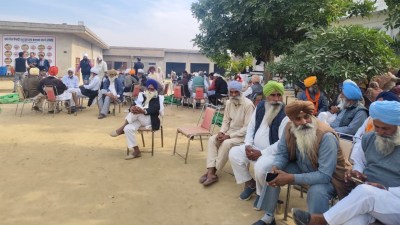The title of English poet William Ross Wallace’s poem ‘The Hand That Rocks the Cradle is the Hand that Rules the World’ has become a stand-in proverb to demonstrate the power of motherhood and how it can bring about sweeping changes across generations. When UPSC asked this quote as an essay in the UPSC-CSE Mains examination in 2021, the real challenge for the aspirants was, where and how should the quote be used. Well, that is a common problem with many quotes. So, let’s ask our expert to help you with a model essay on this topic.
In UPSC Essentials’ special series ‘UPSC Essays Simplified’, we take you through some of the sample essays written by our expert Pranay Aggarwal covering questions of past years.
Just FYI:
What is the full quote and where does it come from?
(You don’t need to know the poem or its source. However, there isn’t any harm to enrich your knowledge with something as interesting as this poem.)
“For the hand that rocks the cradle// Is the hand that rules the world,” is the refrain in Wallace’s poem, and also its title. Even though the poem, first published in 1865, is rarely remembered today, the refrain itself has become a popular way of highlighting the impact of motherhood.
The poem goes:
Mothers first to guide the streamlets,
From them souls unresting grow—
Grow on for the good or evil,
Sunshine streamed or evil hurled,
For the hand that rocks the cradle
Is the hand that rules the world.
The line’s near-universal imagery of a ‘hand rocking the cradle’, an act which soothes and comforts an infant, is a simple yet powerful method of evoking mother figures in the minds of readers or listeners. The next line, which is almost the opposite of the first in its grandness (‘the hand that rules the world’) connects maternal intimacy to a state of power that can change the world itself.
Story continues below this ad
Hand That Rocks the Cradle Rules the World
— Pranay Aggarwal
‘Vande Mataram’, our national song, is a source of inspiration to the people in their struggle for freedom. But when we look at the two words beyond their patriotic essence, their meaning transcends to a pious relation in human lives. This simple yet evocative greeting not only celebrates the Indian nation in the personification of a mother but also captures the national emotion towards mothers and motherhood. The English translation reads – I bow down to you, Mother! Maa, Ammi, Aai, Amma, Bebe, Baa, Mummy, or Mom- the word for mother in any language or culture – is one of the most emotive for its people, and for good reason. It is mothers, after all, who shape us as a person and as a people.
Caregivers in childhood, particularly mothers, have a profound influence on the lives of individuals and societies. In fact, nurturing and early education are significant in determining the course of human history. This essay is an ode to mothers and motherhood, and other caregivers.
Mothers play a vital role in instilling foundational values in children. The formative years of a person’s life are largely shaped by maternal nurturing. From teaching empathy and sharing, to fostering a sense of responsibility, mothers build the moral compass of the next generation. This ensures that individuals grow into responsible citizens, contributing to societal progress.
Story continues below this ad
Motherhood is not just about providing physical care but also emotional resilience. Mothers teach children to face challenges with courage and adaptability. This emotional strength often becomes the bedrock of personal and professional success. Whether it is comforting a child in times of failure or encouraging them to strive harder, mothers prepare their children for life’s adversities, fostering resilience that benefits society at large.
The nurturing provided by caregivers also impacts mental health. A supportive and loving environment fosters emotional intelligence and social skills. This translates into societal well-being, as mentally healthy individuals are more likely to contribute positively to the community.
History is replete with examples of leaders whose greatness was rooted in maternal nurturing. Mahatma Gandhi attributed his commitment to truth and non-violence to his mother Putlibai’s influence. Shivaji owed his courage and valour in large measure to Jeeja Bai. Lincoln famously said, “All that I am, I owe to my angel mother.” Clearly; the values, encouragement, and wisdom imparted by mothers resonates through generations, influencing the course of history.
Mothers of ordinary folks play an arguably even more influential a role in shaping their lives. Each of us fondly carries beautiful memories of our mothers, splendid moments of early childhood we cherish well into our sunset years.
Story continues below this ad
Celebrating motherhood
Indian culture emphasizes the central role of mothers in society, equating them with Gods. Indeed, many Hindu deities are in feminine form; and are reverentially referred to as Ma or Mata – Maa Durga, Maa Laxmi, Maa Saraswati, Maa Kali, Maa Annapurna, Mata Sita and many others. It indicates that women symbolize strength, material prosperity, wisdom, protection, nurturing, and devotion; in our cultural traditions. In modern times, too, mass media recognizes the powerful role of mothers. The iconic movie ‘Mother India’, for instance, celebrates the integrity and resilience of the female protagonist. In real life, Nirbhaya’s mother became a powerful public symbol of strength and justice in the midst of personal tragedy.
To be sure, the veneration of motherhood is universal. Whether it is the Christian devotion to Mother Mary, worship of Aphrodite in ancient Greece, or Muslims regarding Khadija as the ‘mother of all believers’; other cultures too recognize the central role of mothers. Movies like Forrest Gump and novels like ‘Mother’ by Russian writer Maxim Gorky further bear testimony to how other cultures also celebrate motherhood.
Indeed, across the globe, many peoples have personified their whole nation in a reverential feminine form. Quite like our veneration of Bharat Mata, the images of Britannia in Britain, Lady Liberty in USA, and Sri Lanka Mata and Bangamata in our neighbourhood evoke a deferential sentiment amongst their people.
Beyond biological motherhood
While the birth mother literally shares an umbilical cord relationship with the child, other women and caregivers who influence the child in its early years also play important roles.
Story continues below this ad
Foster mothers and adoptive parents enjoy an intimate connection with the child, even if not biological. In Hindu mythology, social motherhood is often put on a pedestal even higher than biological motherhood. Till date, when the devotees reflect on Krishna Leela, they fondly remember his loving bond with Yashoda Maiya rather than Devaki.
Other mothers While mothers remain primary caregivers, society has evolved to include others to assist mothers in fulfilling these crucial roles. Nannies, babysitters, and baby daycare centres play an important role in rearing children; ensuring their safety and well being. These professional services enable women to manage child care along with their other obligations.
Technology, too, now helps rock the cradle! Baby monitors, online parenting forums, and educational toys help modern parents raise children securely, in sync with best practices; and enhance the child-rearing experience.
A Role for Fathers… The idea of caregiving has evolved beyond motherhood to include shared parenting. Fathers play an increasingly active role in nurturing their children, contributing to their emotional and intellectual development. This shared responsibility not only reduces the workload of women, but also ensures that men can more actively partake in the joys of parenting, strengthens family bonds, and creates a more wholesome environment for children.
Story continues below this ad
A Larger Canvas for Caregiving
Women engage in care-work outside the home as well. Due to the gendered nature of work, women continue with the caregiving role in the education system in many societies. As educators, women play a crucial role in nation-building. Female teachers in primary classrooms are often the first educators outside the home. In this role, they mold the intellectual and moral fabric of students. Women, as primary educators in homes as well as schools, are thus the architects of a nation’s future. Educators like Montessori have indeed revolutionized early childhood education.
Old age is compared to a second childhood. As populations age globally, caregiving roles increasingly include elderly care. Women, who also traditionally shoulder this responsibility, play a vital role in ensuring the dignity and well-being of older people.
Beyond Caregiving
While celebrating the contributions of women as caregivers, it is imperative that we do not box them into that role. Beyond caregiving, women can and have led transformative societal changes – spearheading social movements, initiating reforms, pioneering technological advances, and guiding entire nations. Be it Ahilyabai Holkar in the early modern period, Sarojini Naidu and Annie Besant during the freedom struggle, or Indira Gandhi after Independence; these stellar women have shaped Indian history. Reformers like Savitribai Phule, Pandita Ramabai, and Tarabai Shinde have shaped our social consciousness. Children, boys and girls alike, look up to the likes of PV Sindhu, Mary Kom and Sakshi Malik as role models. Clearly, the hand that rocks the cradle shapes our lives beyond it as well!
In many ways, women have emerged as key drivers of grassroots change. Self-help groups, women-led cooperatives, and community health initiatives showcase the transformative power of women’s engagement. For example, Anganwadi and ASHA workers have strengthened our public health care system, helped combat child malnutrition and serve marginalized communities. Mother figures like Ma Amritanandamayi and Mother Teresa have made compassionate contributions to societal welfare.
Story continues below this ad
Women’s participation in administration often brings empathy, sensitivity, and sustainability to governance and organizational leadership. Such nurturing qualities, associated with caregiving, also translate into effective governance and management; and ensure equitable and inclusive growth.
Women have also been at the forefront of environmental conservation worldwide. The nurturing instinct of mothers extends to the planet as a whole, ensuring sustainable development. This echoes the reverence for ‘Mother’ Nature or ‘Mother’ Earth in many cultural traditions. From the Chipko Movement in India to Wangari Maathai’s Green Belt initiative in Kenya, women’s efforts have safeguarded natural resources for future generations.
Overcoming Challenges
Despite their profound influence, women often face significant societal challenges; such as the unpaid nature of care work, gender inequality, and the dual burden of professional and domestic responsibilities. Addressing these issues through policy changes, such as equal pay, paid parental leave, and access to quality childcare, can empower women to contribute even more effectively to society. Empowering women, thus, is a strategy for social progress. Educating and providing opportunities for women ensures that they can fully participate in shaping the future.
Clearly, the hand that rocks the cradle wields unparalleled influence in shaping individuals, societies, and nations. Whether as mothers, educators, mentors, or leaders; women and caregivers nurture the values, skills, and resilience that define human progress.
Story continues below this ad
About our Expert: Pranay Aggarwal is an educator and mentor for aspirants preparing for UPSC Civil Services exam. With more than 10 years of experience guiding civil service aspirants, he is acknowledged as an expert on civil service exam preparation, especially on subjects like Social Issues and Sociology. He is the India representative on the Research Committee on Education, Religion and Political Sociology for UNESCO’s International Sociological Association and a committee member of Indian Sociological Society and its committee on social movements. He is also the Convenor of Indian Civil Services Association, a think tank of senior bureaucrats.
Subscribe to our UPSC newsletter and stay updated with the news cues from the past week.
Stay updated with the latest UPSC articles by joining our Telegram channel – Indian Express UPSC Hub, and follow us on Instagram and X.
For your queries and suggestions write at manas.srivastava@indianexpress.com.


































